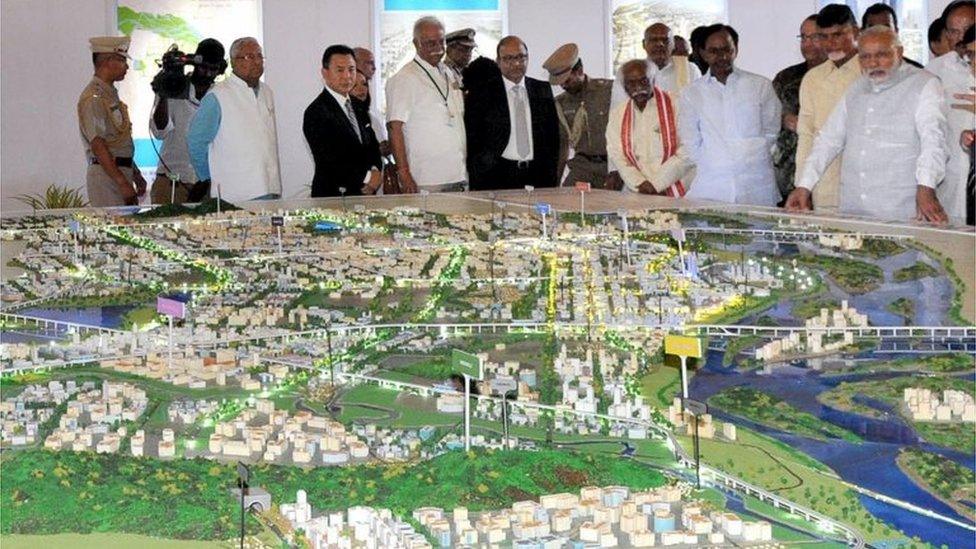Is new India state capital Amaravati more bane than boon?
- Published

India hopes Amaravati will put Andhra Pradesh on the global map
India Prime Minister Narendra Modi laid the foundation stone for a new capital for the south Indian state of Andhra Pradesh on Tuesday, amid much fanfare. But although Amaravati is being touted as a city that can "make India proud", a number of concerns, including its impact on the ecology, have been raised. Sriram Karri finds out more.
When Prime Minister Narendra Modi laid the inauguration stone for Amaravati on Tuesday, he said the new city represented the spirit of a state which would lead an economic revolution in India.
The Andhra Pradesh chief minister N Chandrababu Naidu added that his aim was to create a capital city that would make India proud and the world envious.
The south Indian state was forced to look for a new capital after it was split in two to create India's 29th state, Telangana. The current capital Hyderabad went to the new state, although both will share it for 10 years.
The plans for Amaravati are ambitious to say the least.
The city will be developed on a land area of 7,500 sq km (2895 sq miles) over the next 10 years, and is envisaged to be 10 times bigger than Singapore, which is helping the state government construct it.
'Opportunity, not challenge'
Instead of using the Land Acquisition Act, which has often led to litigation and agitation, to build his city, Mr Naidu has proposed a scheme where farmers will voluntarily surrender their land, in exchange for developed land in the city.
Mr Naidu, who is widely held to be responsible for converting Hyderabad from a sleepy historic town into a global software destination during his previous term as chief minister between 1995 to 2004, is brimming with confidence.

Mr Naidu believes he can repeat his Hyderabad success with Amaravati
"Some people would have seen a challenge, but I saw a great opportunity. Amaravati will not only be India's best new city and capital, but a leading global destination. I want to build it with people's participation. I want everyone to own a part of it," Mr Naidu told the BBC.
The lore surrounding what Mr Naidu did for Hyderabad is legendary.
Microsoft chairman Bill Gates' decision to build the company's biggest development centres outside the US in Hyderabad was made because he was so impressed by a power point presentation made by Mr Naidu, or so the story goes.
But not everyone is impressed.
'One-sided development'
Farmers are angry because they feel the plans for Amravati exclude them.
"Mr Naidu has gone back to his one-sided development talk that benefits corporates and businesses at our expense. He is taking away land from the most fertile agrarian belt in India, which yields three crops a year," Mallela Harindranath Chowdary, a farmer leader, told the BBC.
Mr Chowdary also alleges that the government is using police force to pressure farmers to surrender their land to the state.

Farmers say they are being forced to give up their land for the city
Mr Naidu has however dismissed the allegations as being politically motivated.
"Some political leaders are perpetually dissatisfied and obstruct development, which is crucial to remove poverty. Farmers have most given us land because they know the benefit of owning land in a developed city," said Naidu.
The government has also imposed a law that prohibits gatherings of people in and around the area where Amravati is being constructed, to "prevent political agitations".
But it's not just farmers who are protesting against Amaravati.
Ecological disaster?
India's environment body, the National Green Tribunal (NGT), has also expressed concern that the state government did not complete a mandatory environmental assessment before deciding on the location of the city.
Environmentalists say the state has not followed any of the procedures or complied with requirements to carry out a project of this scale.
Adding to concerns is the fact that Mr Naidu has asked the central government to release over 20,000 hectares (49,240 acres) of additional reserved forests around the capital region.

Environmentalists say in the next few months, Andhra plans to cut over 10 million trees
"It violates the Conservation of Forests Act. By law, they are supposed to create forests in double the land - 40,000 hectares in wasted forest lands - and plant twice the number of trees cut," a forest officer who wished to remain anonymous, told the BBC.
"In the next few months, Andhra plans to cut over 10 million trees. Not only is it against all norms, it is an invitation for an ecological disaster.
"They will cut forests within no time, but take decades to plant that many trees. They will destroy forests with diversity and plants standard forestation saplings like teak, eucalyptus, neem and Red Sanders.
"What will happen to water bodies, smaller trees and plants, shrubs, animals, birds and insects?" he said.
"It is not a people's capital but a contractor's capital," a senior Andhra Pradesh opposition official, Ummareddy Venkateswarlu, told the BBC. "We are not opposed to Amaravati, but the illegal ways adopted to create it."
Sriram Karri is author of the best-selling, MAN Asian Literary Prize longlisted novel, Autobiography of a mad nation